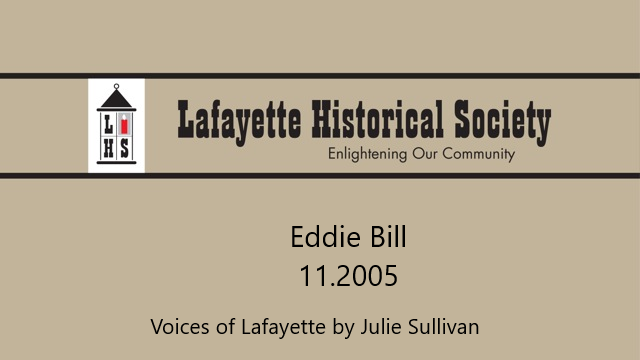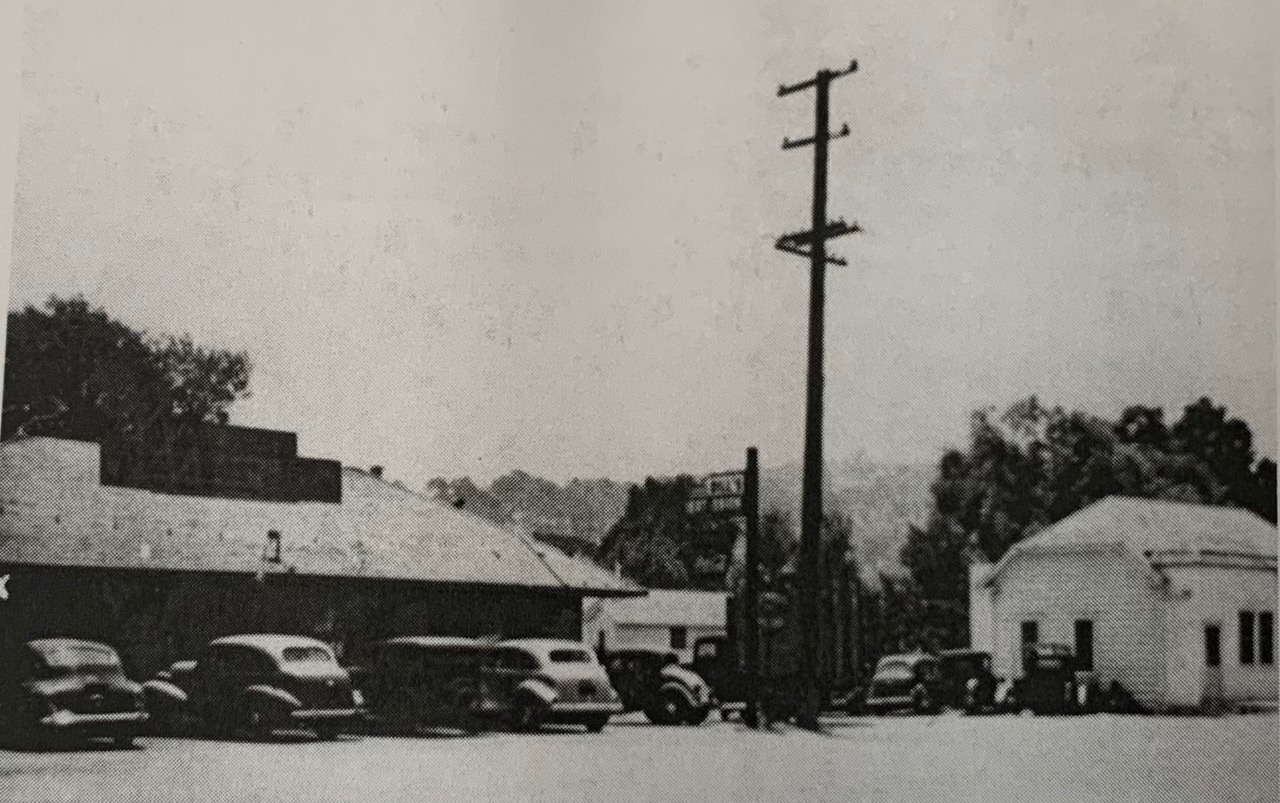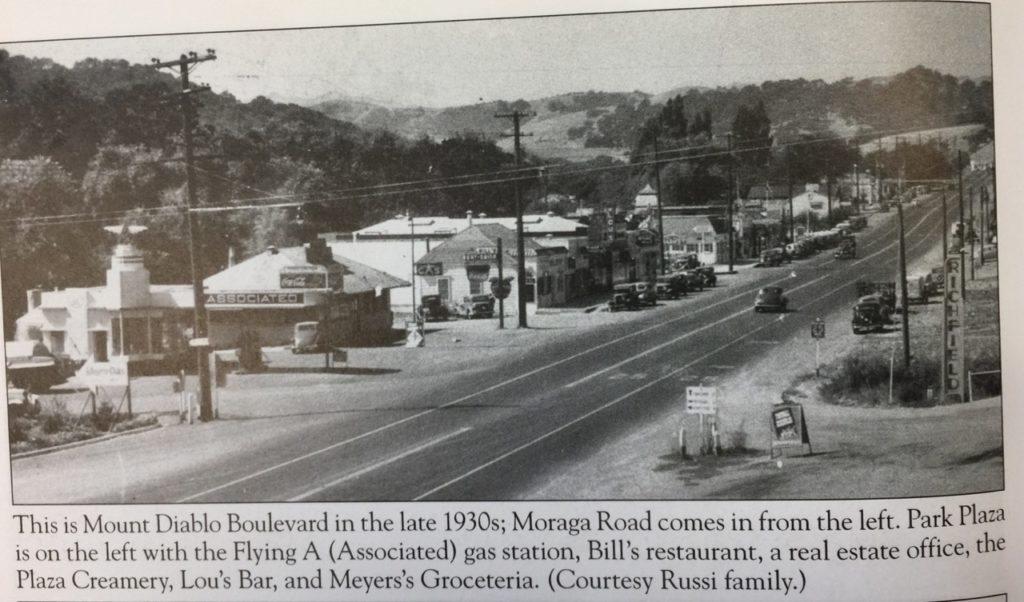Summary:
Eddie Bill was interviewed by Julie Sullivan in November, 2005. Both of his parents were German Immigrants who met in Stockton, where Eddie was born. in 1934, when he was 5, Eddie’s parents moved to Lafayette and opened the restaurant “Bill’s Place”. They struggled to keep it open for a few years, with the whole family, including a grandmother, working in the business and sleeping in one room right off the kitchen. Then in 1937 everything changed with the opening of the Caldecott Tunnel. The restaurant soon added dinners form Oakland and San Francisco as regular customers, along with the local ranchers and summer folk. Eddie’s father closed the restaurant and returned to Germany, from which he later returned with a new wife, when Eddie’s mother died in 1950.
Oral History:
Everybody who was anybody in Lafayette in the 30’s and 40’s ate at Bill’s Place.
“Colonel Garrett (who built the Garrett Building, now Postino) used to come every Saturday when we had turkey,” Ed Bill, the owners’ son, remembers. “Ted Williams’ (all star with the Boston Red Sox) father was a photographer in Walnut Creek, and he and his wife used to come in and eat almost every night. During World War II army trucks went right down Mt. Diablo from Camp Stoneman (in Pittsburg), and the men would stop and eat. Donald Rheem (developer of Rheem, California) built a mansion on Moraga Road. His wife used to come to the restaurant, driven by her chauffeur, also the Franke family that had the tomato cannery in Walnut Creek.”
Edward and Marie Bill opened Bill’s Place in 1934 on the lot behind the Flying A service station (now Wachovia) at the corner of Mt. Diablo Boulevard and Moraga Road and ran it for 16 years.
Edward and Marie emigrated from Germany and settled in Stockton, where they met and married. Ed ‘Dutch’ Bill, their son, was born there in 1929. “My father’s uncle owned 10 acres that included a race track,” Ed explains. “My parents both worked in the cafeteria. They went to night school to earn their citizenship, and they both spoke good English.” Another aunt and uncle ran a restaurant called the Duck Inn on Main Street in Walnut Creek. When Ed’s parents arrived in Walnut Creek, they heard that Larry Sollars had a restaurant for sale in Lafayette.
“I was five when my parents opened Bill’s Place,” Ed remembers. “It had three booths on one side and a counter where you could sit eight, then three tables on the far wall. There was an oil burner for heat, and off the kitchen was one big room where we all lived, my parents, my grandmother, and me. “Red Roberts had a garage in the back, and the old fire house was down by the creek.
“My dad was the cook, and my mother took care of the front. They worked seven days a week from six in the morning till midnight, or sometimes two a.m. Then they’d get up and start the stove again at six a.m. In the first three months my folks were about ready to call it quits, then in March things started to pick up.
“They got so busy on Sundays they had to close. The help never even got a chance to eat. That was when the tunnel opened, and the traffic was busy. Coffee was five cents, ham and eggs were around a dollar, and at one time I think dinners got up to $1.25. My parents had a license for beer, wine and whiskey and an off sale license. We used to have a liquor store in back of the counter. Later they used to close on Wednesdays. That was when they had a cook and three waitresses.
“When I came home from school I used to fill the beer boxes with bottles. I’d have to bring them up from the basement. I was 10 or 11,” Ed adds. “I used to have to wash dishes once in a while. I was on the basketball team when I was a freshman at Acalanes. Two or three times the dishwasher didn’t show up, and I couldn’t go to the game because I had to wash dishes.
“In 1941, when the war started, a woman who used to come to the restaurant every morning for coffee told my mother she was going to sell her house on Thompson Road My mother bought it for $7,500 with all the furniture. My mother knew how to do everything. Later my parents bought two lots on Mountain View. My parents were going to put in a restaurant there, but it didn’t work out.”
During high school Ed spent weeknights at the house on Thompson Road, and his parents would join him on Sundays. “After they washed the kitchen down and cleaned up, friends would come in and talk. My mom would cook a dinner, then they’d go back to the restaurant Sunday night. They had to watch it to make sure no one broke in. One time they were sleeping in back and heard noise out front. Some guy had taken the glass out of the window and jumped off the counter. He jumped back out and took off.
“My parents used to know everybody in town. They put out good food, and my mother always supported the Catholic Church.”
In 1950 Marie passed away. “She was 52,” Ed says sadly. “My mother and father were always going to work one more year then retire.” After Marie died, Ed’s father closed Bill’s Place and went to Germany to visit family. He met and married his second wife there. They came back to Lafayette, but he never opened another restaurant. Ed continued living in the Thompson Road house. “The freeway took the house around 1952 while I was in the service, and my dad built a house way up on top of the hill. Then BART came in and he had to give it up, too, in the 1960’s.”
Ed played basketball and football at Acalanes and was All County in basketball in 1947. He was also on the track team and won first place in discus in the county. Ed graduated from Contra Costa College with an associates degree in 1950. “It was at the Kaiser shipyards in Richmond,” he says. He served two years in the Navy during the Korean War, then earned a degree in physical education from San Jose State in 1956.
While working for Canada Dry beverages in Berkeley, Ed played amateur softball for a number of years. He and two partners owned a Berkeley night spot in the mid-50’s. Later he joined the longshoremen’s union and retired in the mid-90’s. He is divorced, has one son, and lives in Walnut Creek.
Ed remembers playing basketball and touch football at Lafayette Grammar School. “They had the tennis courts there, and Bob Gerow played tennis with Harry Packard, who had the dime store. Bud Long also had the dime store. Doc Gerow was a tennis player, too. I remember when Port Chicago blew up in 1944 or around then, and they had that big fire and all the sailors got killed. I went downtown, and all the windows in the dime store were broken. Bud Long told me and another kid to stay there and watch the store and he’d pay us. We stayed all night.
“Mickey Meyers had the grocery store. Doc Richards had a drug store later. Lou Borghesani had a clothing store. Lou and Johnny Combs had the Roundup, then Harry Costa bought it. Heinie Hodapp had a barber shop on the corner. The water company had an office in there. Paul Fix had the Mayflower Bakery in the brick building where Freddie’s Pizza used to be (now Pizza Antica). Jack Hageman let us in for free at the Park Theater if we got him a brick of ice to keep the drinking fountain cool.
“I miss the old guys like Mickey MacPherson,” Ed adds.
Excerpted from “Voices of Lafayette” by Julie Sullivan. This book is available for purchase in the History Room.




Super Cool, any articles on the 50’s and 60’s I grew up in Lafayette starting 1955
There are many interesting stories in our newsletters. On the LHS website, click “Newsletters” at the top left of the page to read them. You can also find many on our Facebook page. If you become a member of LHS you will receive four newsletters per year. Thanks
you a relative of Brent” Louie ” Bohannon ?